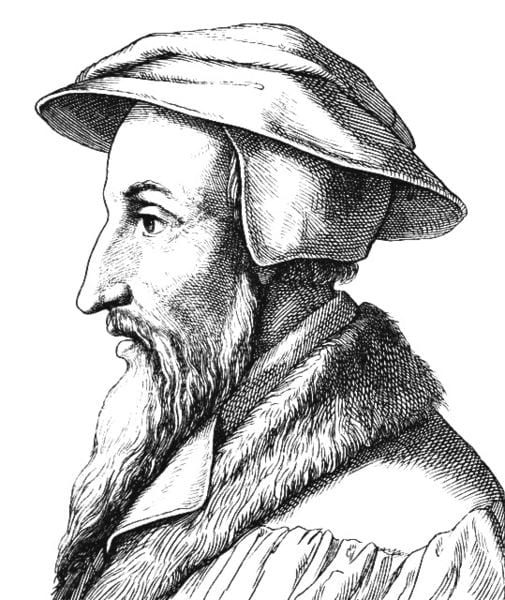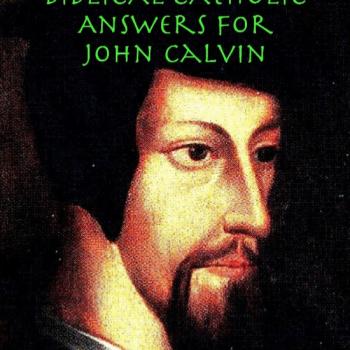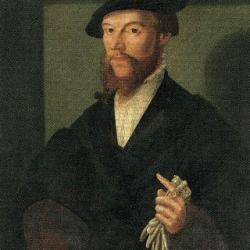
A Catholic on my blog first brought this issue up in a combox thread. To his credit he later retracted the line of inquiry and accusation after I presented the material presented below (“let me say you did great job of getting to the truth of this matter. You’ve convinced me that there is nothing to this old and unfounded slander against Calvin. . . . congratulations on a job well done.”).
But first he had cited a judgment: “both the character and morals of Calvin were infamous” — from Catholic historian Johann Baptist Alzog (1808-1878), appearing in both his books, History of the Church (1912) and Manual of Universal Church History (1878).
Before I looked into the question a bit to see what I could find, I had asked: “Who is saying that Calvin had ‘bad character and loose morals’, and what evidence does he produce for this claim? I would take broad accusations like that with a huge grain of salt.”
To answer my question, the article, “What are we to Think of John Calvin?” by a Rev. Fr. Philippe Marcille was produced, as well as The History of the Protestant Reformation, Vol. 1, by Archbishop Martin Spalding (1810-1872; see also volume 2).
!!!!! I don’t know the first source. It could be some goofy “reactionary” Catholic. They love to “find” spectacular dirt on Protestants (and popes as well). Yes, sure enough: my suspicion was dramatically confirmed. This priest has written at least two articles for what appears to be an SSPX magazine (Lefebvrite schismatics): The Angelus.
That’s quite sufficient in my mind to totally discredit the man as any sort of credible expert on anything to do with the Church, let alone writing about the Protestant founders. I found his name: “Abbot Philippe Marcille FSSPX”. FFSPX stands for “Fraternité Sacerdotale Saint Pie X”; see this schismatic group’s website.
Archbishop Spalding is an old source. Catholic writing on Protestants was quite biased for a long time. A lot of the more negative assertions have been discarded with more objective and ecumenical scholarship. Abp. Spalding was not a professional historian.
Unless this can be backed up by someone of impeccable historiographical credentials, I wouldn’t accept it as factual at all, let alone spread it around. Now, of course, you have me curious (having never heard this before), and I will look to see what I can find, but it strikes me as the kind of sensationalistic charge that someone would drum up if they wanted to utterly discredit someone. I don’t know who would have started it (if it is untrue), but it likely began during Calvin’s lifetime.
Jerome Bolsec, an ex-Carmelite friar who embraced the reformed faith in Paris, settled in Geneva and served as a physician. He publicly attacked Calvin’s doctrine of predestination, was banished from Geneva, and eventually returned to catholicism. His “revenge was to publish in 1577 a scurrilous biography of Calvin, accusing him among other things of sodomy, which continued to be an arsenal for anti-Calvinist polemics for the next two centuries” (Lindberg, 266).
The article on Bolsec in Wikipedia confirms that his book was not exactly a neutral biographical source. Actually, it was taken right from The Catholic Encyclopedia (1913), which states:
published biographies of the two Genevan reformers, Calvin and Beza (1519-1605). These works are violent in tone, and find little favour with protestant writers. Their historical statements cannot always be relied on. They are “Histoire de la view, des moeurs . . . de Jean Calvin
Williston Walker (who was an actual historian at Yale), in his book, John Calvin (New York: Schocken Books, 1906; rep. 1969) writes about Bolsec on pp. 116-119, 315-320. Some excerpts:
The more specific charge, to which reference is now made, was formulated thirteen years after Calvin’s death, by Jerome Hermes Bolsec . . . that Calvin had been convicted of heinous moral turpitude . . . No evidence has ever been produced of the existence of such a document as Bolsec alleges. Jacques Desmay, the earnest Catholic writer who used his stay as Advent and Lenten preacher at Noyon in 1614 and 1615 to learn all he could of Calvin’s life there by records and tradition, found nothing of it. An equally determined Roman historian of Noyon, Jacques Le Vasseur, in his Annales of 1633, expressly repudiated it; and careful modern Roman Catholic scholars, such as Kampschulte and Paulus, reject it as “unworthy of serious refutation.
. . . The whole calumny would be unworthy of discussion had the accusation not been repeatedly renewed by a certain class of controversialists during the last century — in one instance as recently as 1898. (pp. 116-119)
5. Philibert Berthelier (or Bertelier, Bertellier), an unworthy son of the distinguished patriot who, in 1519, had been beheaded for his part in the war of independence, belonged to the most malignant enemies of Calvin. He had gone to Noyon, if we are to believe the assertion of Bolsec, to bring back scandalous reports concerning the early life of the Reformer, which the same Bolsec published thirteen years after Calvin’s death, but without any evidence.768 If the Libertines had been in possession of such information, they would have made use of it. Berthelier is characterized by Beza as “a man of the most consummate impudence” and “guilty of many iniquities.” He was excommunicated by the Consistory in 1551 for abusing Calvin, for not going to church, and other offences, and for refusing to make any apology.
768 See above, p. 302 sq. That abominable slander about sodomy, which even Galiffe rejects, Audin and Spalding are not ashamed to repeat.
“Additional Notes” to a Life of Calvin, refute the disputed charge as well:
The life of Calvin was also charged with immoralities. But this was done principally by the famous Bolsec, of whom Beza gives some account.
After he had been banished from Geneva, through the influence of Calvin and Farel, for sedition and Pelagianism, he wrote a life of Calvin, with a view to destroy the reputation of that great and good man.
The great Dr. Moulin observes, that not one of Calvin’s innumerable enemies ever carped at the purity of his life, but this profligate physician, whom Calvin had procured to be banished from Geneva, for his wickedness and impieties. The reproach of such a man, says Middleton, was an honor to Calvin, and especially upon such an account, for as Milton truly says, “Of some to be dispraised, is no small praise.” The calumnies of Bolsec, however, were reiterated by other enemies, and are sometimes, even in this age, raked from the filth where truth has long since consigned them. “One of the greatest uses,” says Middleton, “which may be drawn from reading, is to learn the weaknesses of the heart of man, and the ill effects of prejudices in points of religion. No less a person than the great cardinal Richelieu, has produced all accusation against Calvin, on the credit of Bertelier, than which none was ever worse contrived, and worse proved; though it has been adopted, and conveyed from book to book. Bertelier pretended, that the republic of Geneva had sent him to Noyon, with orders to make an exact inquiry there into Calvin’s life and character; and that he found Calvin had been convicted of sodomy; but that, at the bishop’s request, the punishment of fire was commuted into that of being branded with the Flower-de-luce. He boasted to have an act, signed by a notary, which certified the truth of the process and condemnation. Bolsec affirms, that he had seen this act; and this is the ground of that horrid accusation. Neither Bertelier, nor Bolsec, are to be credited. If Bertelier’s act had not been suppositious, there would have been at Noyon, authentic and public testimonies of the trial and punishment in question; and they would have been published as soon as the Romish religion began to suffer by Calvin’s means. Bertelier had no party against him in Geneva more inexorable than Calvin, who held him in abhorrence, on account of his vices. Bertelier was accused of sedition and conspiracy against the state and church: but he ran away, and, not appearing to answer for himself, was condemned, as being attainted and convicted of those crimes, to lose his head, by a sentence pronounced against him, the sixth of August, 1555. No envoy or deputy was ever sent from Geneva on public business, who was not in a higher station than that of Bertelier; besides, there were some considerable persons at Noyon, who retired to Geneva, as well as Calvin: by whose means it was very easy to receive all the information which could have been desired, without going farther.
If what Bertelier said was true, he would have had his paper when he fled from Geneva: but it is plain he had not the commission he boasted of, after that time. But can any one believe, that, before the year 1555, when those who were called heretics durst not show themselves for fear of being burnt, a deputy from Geneva should go boldly to Noyon, to inform himself of Calvin’s life? Who will believeth that if Betrelier had an authentic act of Calvin’s infamy in 1554, he would have kept it so close, that the public should have no knowledge of it before 1557? Was it not a piece which the clergy of France would have bought for its weight in gold? ‘But why (says Bayle), do I lose time in confuting such a ridiculous romance? Nothing surprises me more than to see so great a person as cardinal de Richelieu, depend on this piece of Bertelier; and allege as his principal reason that the republic of Geneva did not undertake to show the falsehood of this piece.’ The truth is, this cardinal made all imaginable inquiry into the pretended proceedings against Calvin at Noyon, and that he discovered nothing; yet he maintained the affirmative on the credit of Jerom Bolsec, whose testimony is of no weight in things which are laid to Calvin’s charge. Bolsec would have been altogether buried in oblivion, if he had not been taken notice of by the monks and missionaries for writing some satirical books against the Reformation. He was convicted of sedition and Pelagianism at Geneva, in 1551, and banished the territory of the republic. He was also banished from Bern: after which he went to France, where he assisted in persecuting the Protestants, an even prostituted his wife to the canons of Autun. He was an infamous man, who forsook his order, had been banished thrice, and changed his religion four times; and who, after having aspersed the dead and the living, died in despair.
Varillas thought Bolsec a discredited author: Maimbourg rejected the infamy that was thrown upon Calvin: and Florimond de Remond owns, they have defamed him horribly. Papyrius Masso spoke very ill of Calvin, but would not venture to mention the story of the Flower-de-luce: and he called those, mean wretched scribblers, who reproached that minister with lewdness. It is not strange that cardinal de Richelieu, in one of the best books of controversy that has been published on the part of the church of Rome, should be less scrupulous and nice than Remond, Masso, and Romuald; and that he should give out, as a true matter of fact, the story of Bolsec, which began then to be laid aside by the missionaries? Richelieu intended to have reconciled both religions in France, but was prevented by death; and there was not one story which people did not believe, when it defamed him or cardinal Mazarin.
Protestant regular on my blog “Grubb” wrote: ” Thanks for getting to the truth about Calvin’s character regarding sodomy.” And a Calvinist, Robert Fisher, was nice enough to comment on my blog: “I disagree with you about Calvinism, but I saw how you weren’t drawn in to disparaging Calvin personally, and actually defended him — you are a class act.”
Whatever the truth is, is my concern and goal. It is irrelevant in this regard whether I disagree with someone’s theology or ethics or have some personal beef, etc. My responsibility as an apologist (and a published, somewhat known one, in the public eye) is to seek truth and present it to the best of my ability, in fairness and charity, in all my writings.
***
***
(originally 4-23-07)
Photo credit: Portrait of John Calvin (1509–1564); anonymous, 1854 [public domain / Wikimedia Commons]
* * * * *













